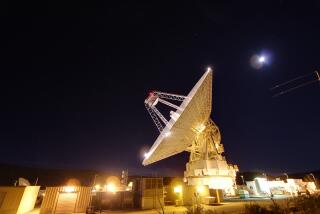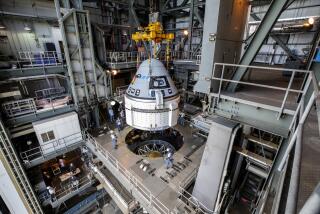NASA Panel Sees Greater Risk of Shuttle Engine Catastrophe
- Share via
KENNEDY SPACE CENTER, Fla. — The main engines of NASA’s space shuttles are reportedly more prone to catastrophic failure than previously believed and are in need of rapid improvement.
A NASA safety panel said the main engines are so temperamental that the risk of a catastrophic failure during liftoff is 1 in 120 instead of earlier NASA estimates of 1 in 171, the New York Times reported in today’s editions.
The panel, which issued its report in January, said the actual risk of such an accident might be less because of precautions taken by the space agency. But it called for a number of urgent improvements to enhance engine reliability and safety.
NASA officials told the newspaper that the panel’s analysis underestimates the engines’ reliability: “Because of extensive checking and processing we have a good safety record,” said Benjamin Buchbinder, manager of shuttle risk assessment in Washington.
NASA laid out plans Friday to replace the shuttle Discovery’s engines, which fired and then cut off three seconds before launch this week.
Shuttle managers are doing everything possible to keep Discovery’s repeated launch delays from bumping the year’s last scheduled flight, the crucial Hubble Space Telescope repair mission, from December into 1994.
“It’s the golden child,” NASA spokesman Bruce Buckingham said. “Not to downplay the others, but there’s a great deal of interest in the Hubble mission.”
Discovery’s engine shutdown virtually guarantees NASA will be unable to carry out its plan for eight shuttle flights this year. There have been four missions to date.
Replacing shuttle engines is easier and quicker than repairing and reinspecting them at the pad. The engines are interchangeable and routinely removed after flight for maintenance.
More to Read
Sign up for Essential California
The most important California stories and recommendations in your inbox every morning.
You may occasionally receive promotional content from the Los Angeles Times.













